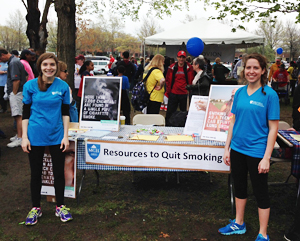About CAM
 Since its formation in 2005, the Center has employed psychiatrists, neuroscientists, psychologists, neuropsychologists, and computer scientists who have conducted clinical and translational research that has resulted in new treatments for addictive disorders, extended the application of existing treatments, and reduced the stigma of addictive disorders.
Since its formation in 2005, the Center has employed psychiatrists, neuroscientists, psychologists, neuropsychologists, and computer scientists who have conducted clinical and translational research that has resulted in new treatments for addictive disorders, extended the application of existing treatments, and reduced the stigma of addictive disorders.
A Wide Range of Clinical and Translational Studies
We have been among the first to test novel pharmacotherapies for addictive disorders, such as acetylcholinesterase inhibitors, dopamine D3 agonists, glycine antagonists and reuptake inhibitors, and cognitive-enhancing agents. We have also been among the first to test mindfulness training and real-time fMRI neurofeedback for addictive disorders. Our clinical trials established the knowledge base for the first clinical practice guidelines for nicotine dependence treatment for people with serious mental illness. Our scientists are working to understand the most effective components of 12-step facilitation groups such as Alcoholics Anonymous and whether this approach is an effective one for teens.
Among the many ongoing translational studies at the Center is a trial to evaluate cognitive control training over brain regions related to craving and inhibitory control with real time fMRI neurofeedback. Other studies evaluate the effect of addictive disorders on both brain and behavioral responses to cues and rewards in the environment, and the effect of social influence on impulsive decision-making and risk-taking. Another line of studies is investigating the similarities in neural response to drug or food cues among those with nicotine dependence and obesity, and their predictive value in smoking cessation and bariatric surgery outcomes. Researchers at the Center have demonstrated that brain activation to smoking cues is highly predictive of smoking cessation outcomes one month later.
Visit the Active Studies page for more information.
Clinical and Patient-Oriented Research Fellowships Available
 The Center offers opportunities for post-doctoral candidates with PhDs in neuroscience, psychology, or neuropsychology, or for physicians with psychiatry residency training. We seek highly motivated individuals for mentored work in the area of patient-oriented clinical or translational addiction research. Prior fellows from the Center have been successful in producing influential scholarly work, obtaining prestigious grant funding, and obtaining academic positions within Harvard or elsewhere after they complete the fellowship. We also train the next generation of clinician scientists though an ACGME-approved clinical addiction psychiatry fellowship for physicians who have completed a psychiatry residency and wish to attain additional training and become board eligible in addiction psychiatry.
The Center offers opportunities for post-doctoral candidates with PhDs in neuroscience, psychology, or neuropsychology, or for physicians with psychiatry residency training. We seek highly motivated individuals for mentored work in the area of patient-oriented clinical or translational addiction research. Prior fellows from the Center have been successful in producing influential scholarly work, obtaining prestigious grant funding, and obtaining academic positions within Harvard or elsewhere after they complete the fellowship. We also train the next generation of clinician scientists though an ACGME-approved clinical addiction psychiatry fellowship for physicians who have completed a psychiatry residency and wish to attain additional training and become board eligible in addiction psychiatry.
For more information on our programs, please visit the Train With Us page.
Treatment
Through the Addiction Recovery Management (ARMS) program and the West End Clinic, we also deliver compassionate, evidence-based care to outpatients and their families. Throughout MGH we offer consultation-liaison addiction treatment for inpatients at the hospital. For more information on how to approach seeking treatment, visit our Treatment page.
Our Departments
The Center for Addiction Medicine is a subset of Massachusetts General Hospital’s Psychiatry Department. It is also part of Mass General Neuroscience, which unites the Departments of Neurology, Neurosurgery, and Psychiatry to bring medical breakthroughs to our patients throughout their lives.


